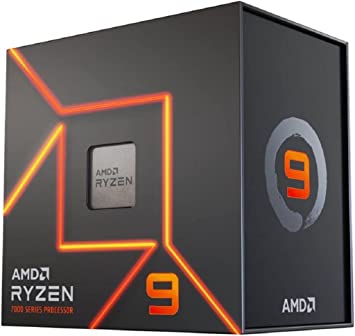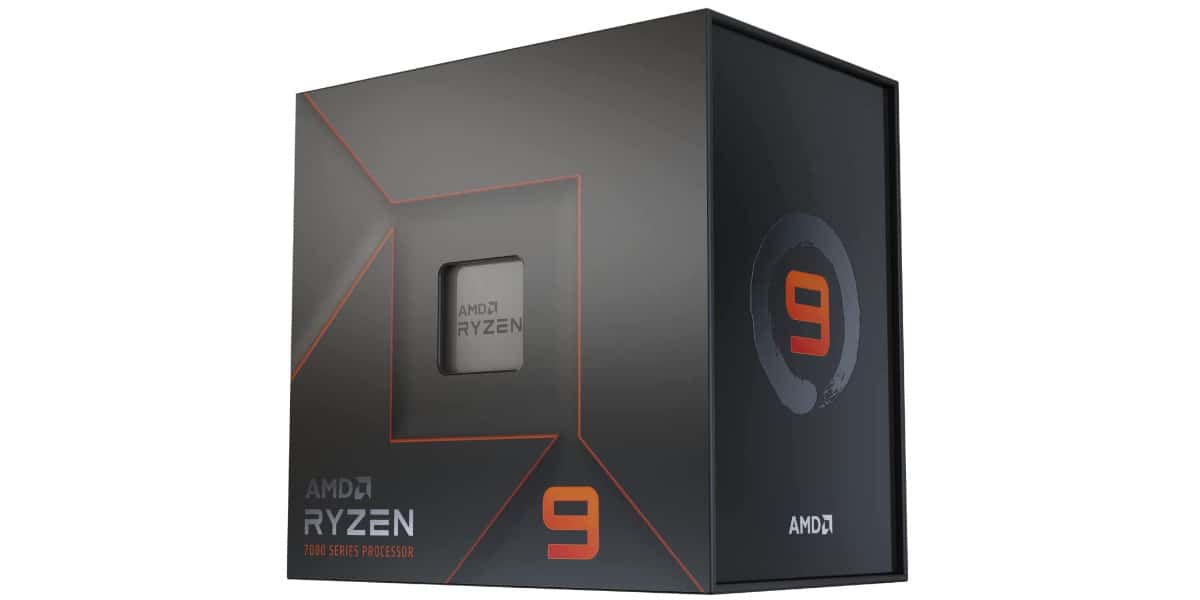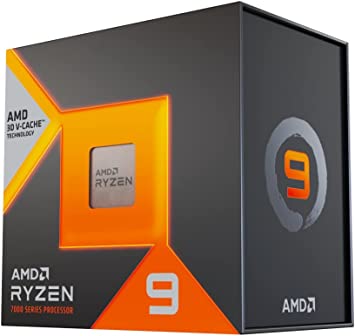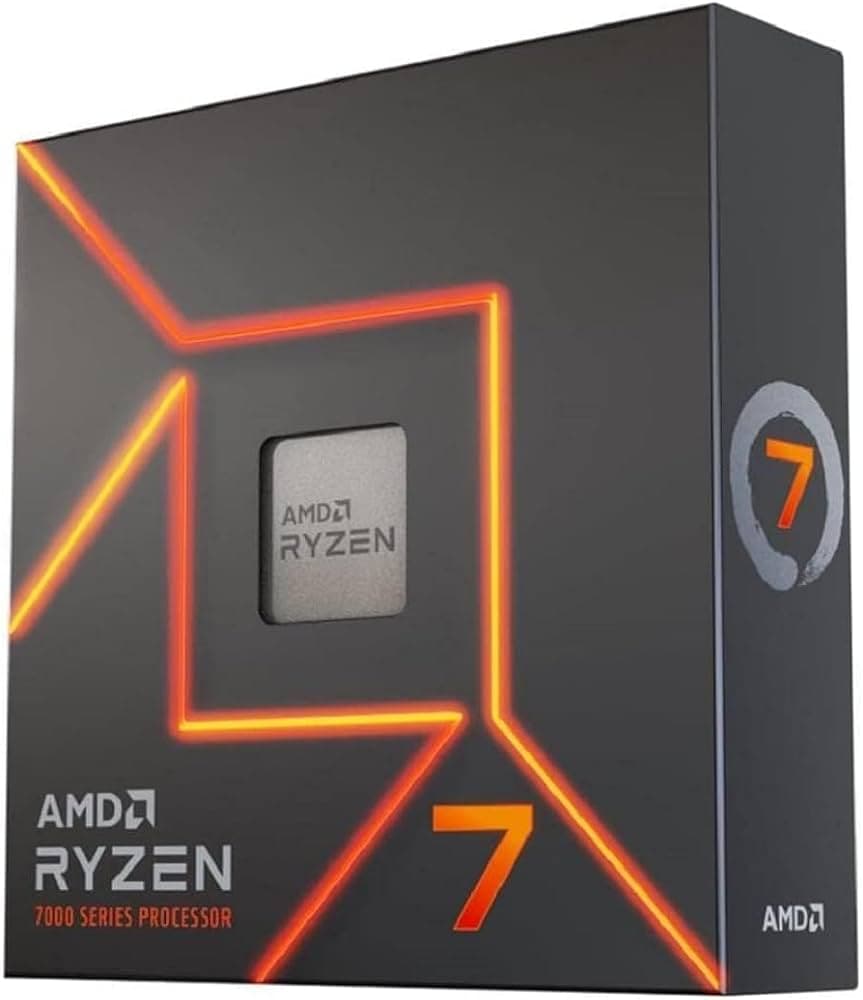Ryzen 9 9900X vs Ryzen 7 9700X: high-end or mid-range, how much do they differ?
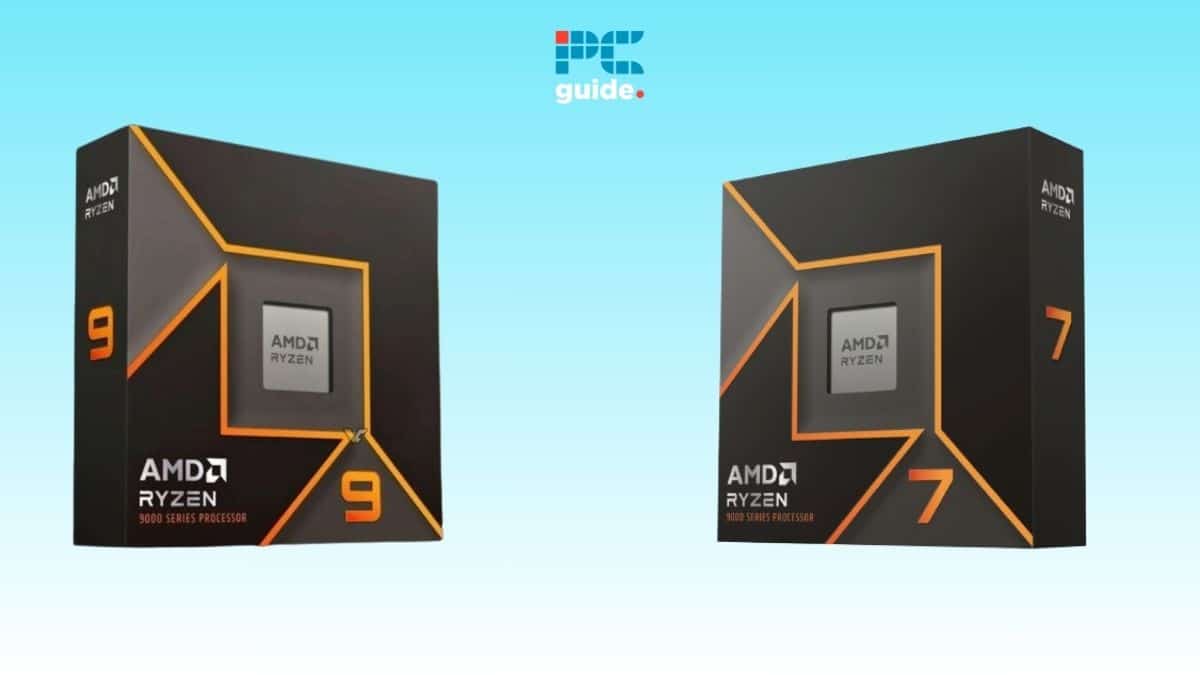
Table of Contents
The high-end and mid-range options from AMD, the Ryzen 9 9900X and 7 9700X, have now launched. Both processors are a part of the AMD 9000 series lineup, meaning they offer the all-new Zen 5 architecture, which promises significant performance improvement over the previous one.
The 9900X is a high-end variant, so it’s mainly for demanding tasks that require a lot of processing power. On the other hand, the 9700X offers a great blend of performance and affordability. But how do the two stack up against each other? We’ll find out in this guide, where we’ll compare their cores, threads, speeds, and much more to get an idea of their performance. We also reviewed the 9700X and found it to be a great processor for multiple tasks.
Prime Day is finally here! Find all the biggest tech and PC deals below.
- Sapphire 11348-03-20G Pulse AMD Radeon™ RX 9070 XT Was $779 Now $739
- AMD Ryzen 7 7800X3D 8-Core, 16-Thread Desktop Processor Was $449 Now $341
- ASUS RTX™ 5060 OC Edition Graphics Card Was $379 Now $339
- LG 77-Inch Class OLED evo AI 4K C5 Series Smart TV Was $3,696 Now $2,796
- Intel® Core™ i7-14700K New Gaming Desktop Was $320.99 Now $274
- Lexar 2TB NM1090 w/HeatSink SSD PCIe Gen5x4 NVMe M.2 Was $281.97 Now $214.98
- Apple Watch Series 10 GPS + Cellular 42mm case Smartwatch Was $499.99 Now $379.99
- ASUS ROG Strix G16 (2025) 16" FHD, RTX 5060 gaming laptop Was $1,499.99 Now $1,274.99
- Apple iPad mini (A17 Pro): Apple Intelligence Was $499.99 Now $379.99
*Prices and savings subject to change. Click through to get the current prices.
If you’re interested in getting the processors, we recommend checking our Where to Buy 9900X and Where to Buy 9700X pages.
AMD Ryzen 9 9900X
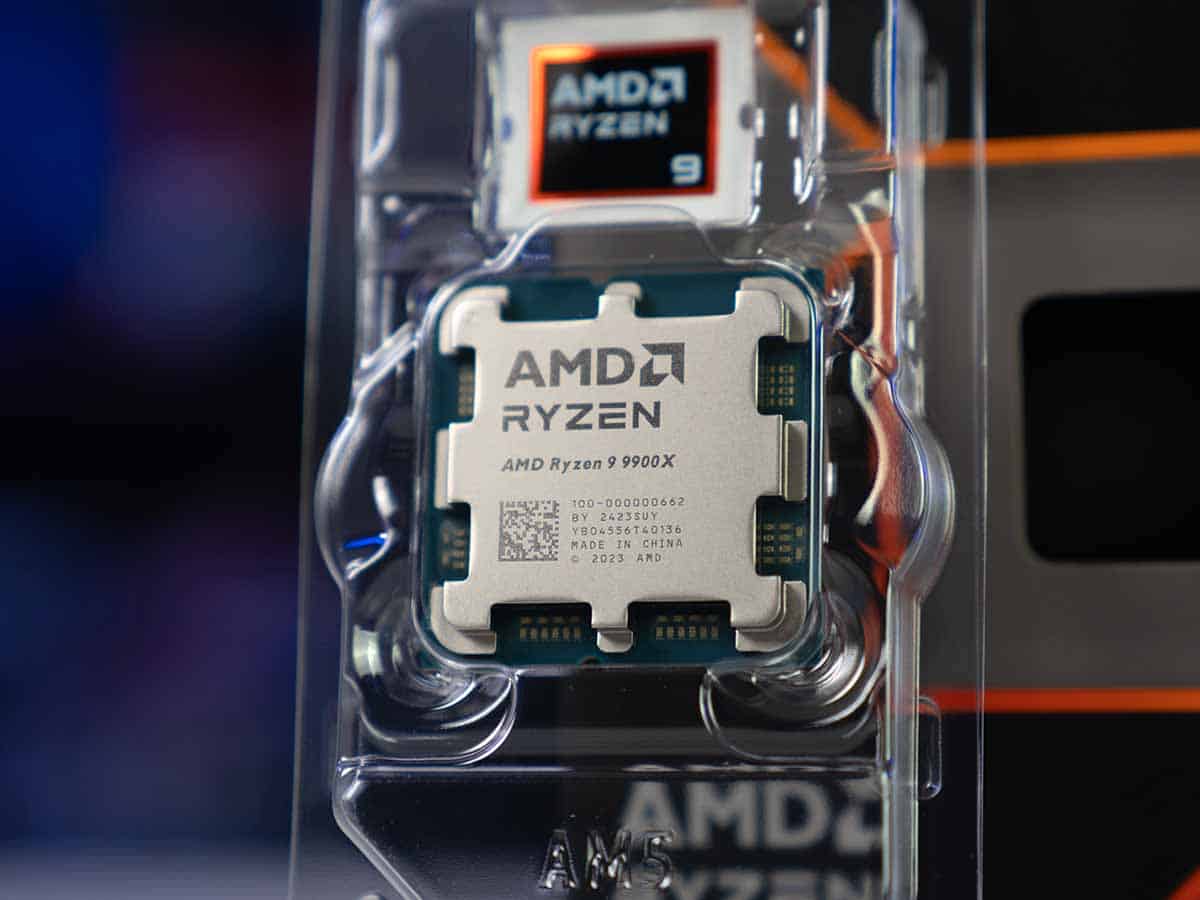
Cores
12
Threads
24
Boost clock speed
5.6 GHz
Base clock speed
4.4 GHz
L3 Cache
64 MB
TDP
120 W
Platform
AMD Socket AM5
Shop on Amazon
CHECK PRICEAMD Ryzen 7 9700X
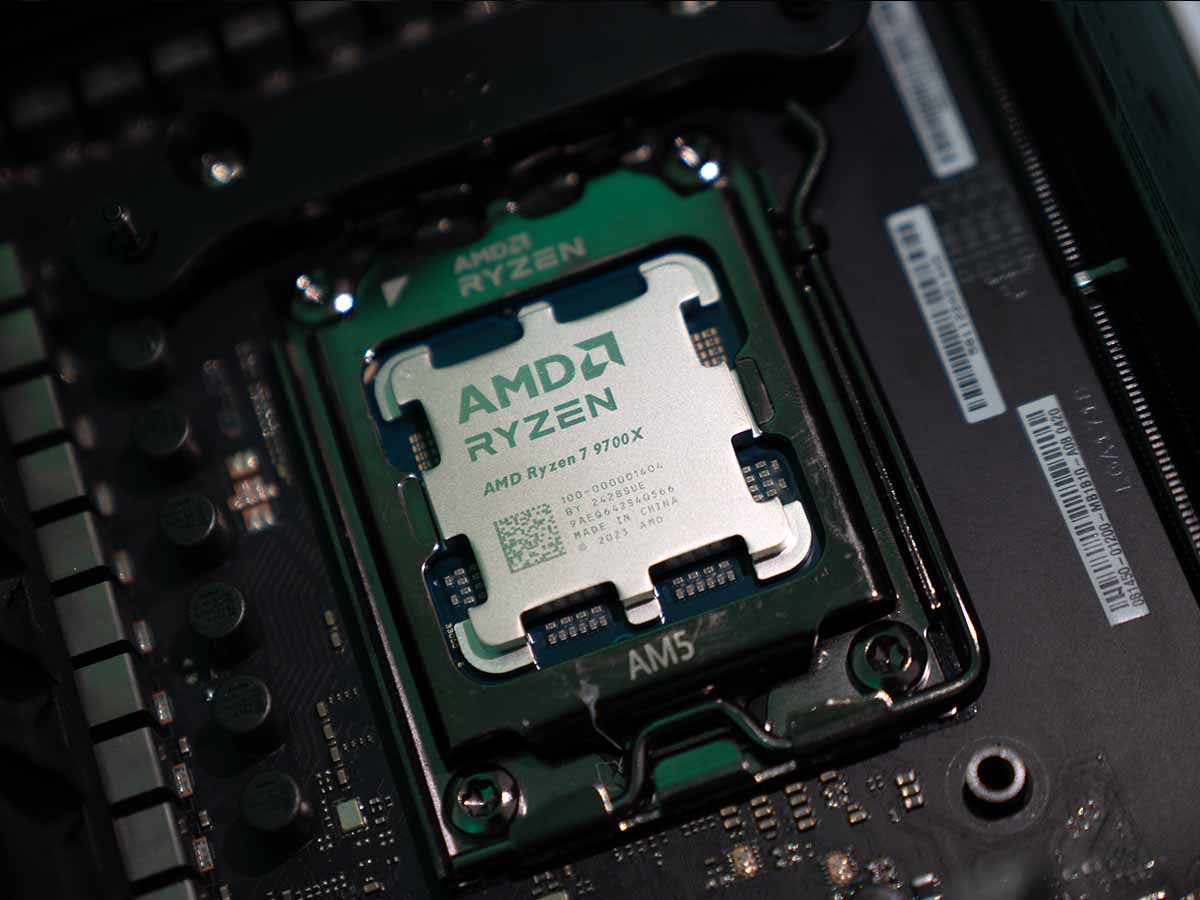
Cores
8
Threads
16
Boost clock speed
5.5 GHz
Base clock speed
3.8 GHz
L3 Cache
32 MB
TDP
65 W
Platform
AMD Socket AM5
Shop on Amazon
CHECK PRICESpecifications
To see the hardware difference between the two processors, we've listed their specifications below.
| Specifications | Ryzen 9 9900X | Ryzen 7 9700X |
| Architecture | Zen 5 | Zen 5 |
| Socket | AM5 | AM5 |
| Process | TSMC 4nm FinFET | TSMC 4nm FinFET |
| Cores | 12 | 8 |
| Threads | 24 | 16 |
| Base clock speed | 4.4 GHz | 3.8 GHz |
| Boost clock speed | 5.6 GHz | 5.5 GHz |
| L3 Cache | 64 MB | 32 MB |
| TDP | 120W | 65W |
| Integrated graphics | AMD Radeon Graphics | AMD Radeon Graphics |
On paper, there seems to be just about the same level of hardware difference you'd expect between a Ryzen 9 and a Ryzen 7 processor, but we'll dive deeper and expand on the various differences to give you a better idea.
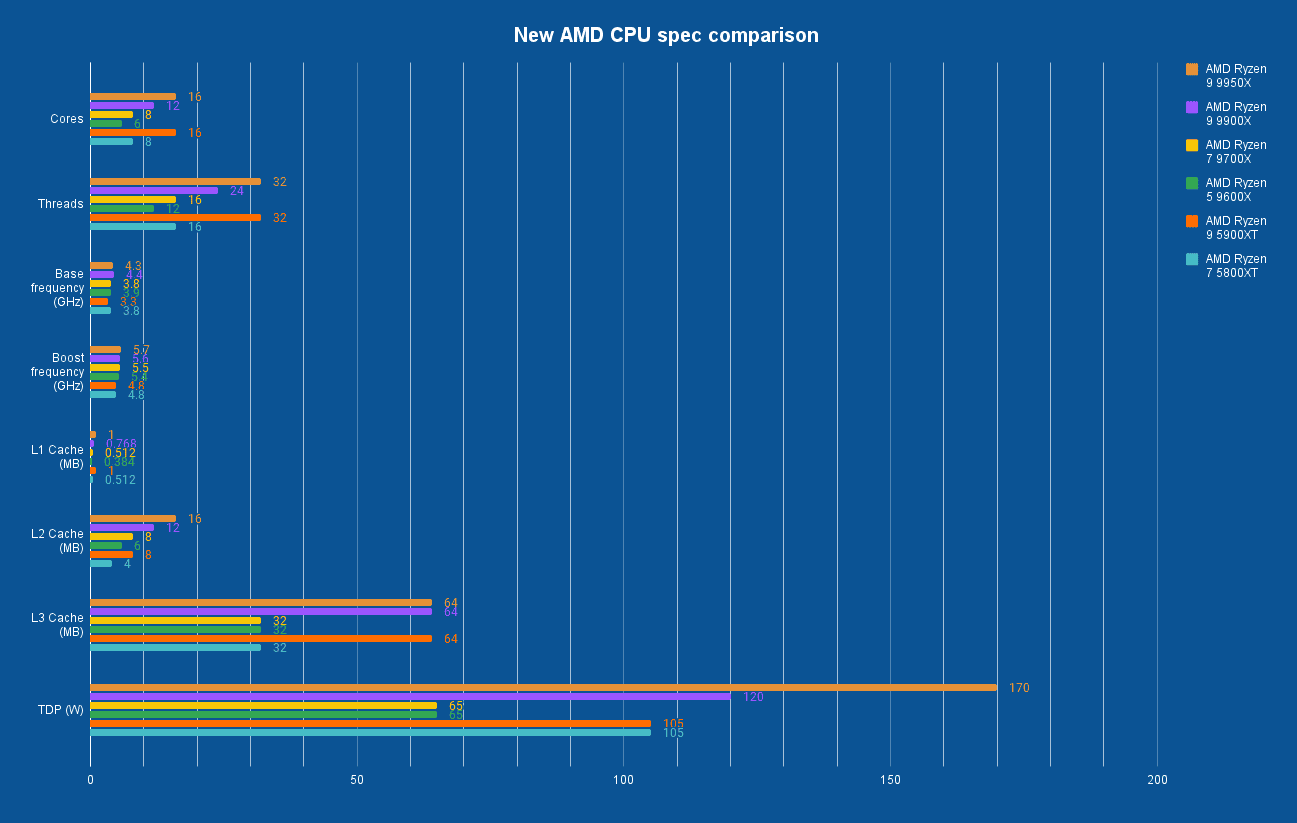
Foundations and cores
The foundation of these processors is the same, meaning that they are based on the same Zen 5 architecture and have the same 4nm processor technology. This means more transistors can be fitted inside the CPU core, increasing efficiency and lowering the power draw.
However, the difference in performance would show itself in applications and tasks that require a higher core and thread count as that 9900X is most likely to outperform the 9700X in those scenarios. To put things into perspective, the 9900X has a 40% increase in core and thread count over the 9700X, which should certainly put the odds in its favor.
Clock rates
The speed at which a CPU can process data is determined by its clock speed; the higher it is, the faster it will be. The big difference between these two processors is in their base clock speed, as the 9900X is 0.6 GHz faster than the 9700X, while the max clock speed only has a difference of 0.1 GHz.
While 0.1 GHz might not seem like a lot, we need to remember that the 9900X has more threads and cores. This means that each core can run at slightly higher speeds, which, combined across all cores, should result in better output.
One thing to note is that you can always overclock these processors to squeeze out every bit of performance, but that will come at the cost of a higher TDP and thermal output. We recommend using the best CPU cooler to keep these powerhouses tame and running optimally.
In our 9700X tests, we were able to get 856 points in the CPU Z single-core test and 8,199 points in the multi-core test. On the other hand, in the Handbrake TOS 4K Fast 1080P encode test, the average speed was 86.2 FPS, while the encode time was 3:26. The gaming performance was also pretty impressive, as we were getting 325 FPS at 1080p low in Cyberpunk 2077. As 9900X is much more powerful, you can expect its performance to be better.
Cache and TDP
The cache is where the CPU stores frequently accessed data so that it doesn't have to utilize resources to fetch that data repeatedly. This helps increase efficiency and lowers access times, resulting in better performance.
The 9900X has twice the amount of L3 cache as the 9700X, meaning it has far more capacity to store data on the chip, which will help enhance its overall efficiency. So, the 9900X takes the crown in this domain as well, but it’s a completely different story when it comes to the TDP.
The 9700X has a power-efficient TDP of 65W, the same as that of processors like the Ryzne 5 5600X, which we've reviewed in-house. On the other hand, the 9900X has a TDP of 120W, which is still relatively easier to manage compared to Team Blue's counterparts but still is 45% higher.
Graphic capabilities
The Ryzen 9 9900X and Ryzne 7 9700X come with AMD Radeon graphics with two cores and a 2200 MHz frequency. This means that their integrated GPUs are on par with each other, with none having the upper hand.
This also means that both processors have additional utility, as they enable you to boot up your PC without a dedicated GPU. On top of that, you have the option to remove your GPU and check for normal functionality as a way of troubleshooting. While you won't get 100+ FPS in games, you should be able to run basic applications like the Microsoft Office suite or surf the internet.
Pricing of the 9900X and 9700X
Right now, you can buy the Ryzen 9 9900X for $499 from Amazon. On the other hand, the 9700X is available for purchase on Amazon for $359, which is $140 less than the 9900X.
How have these CPUs changed from the last generation?
The Ryzen 9 9900X is the second most powerful processor in the Ryzen 9000 lineup. Its predecessors were the 7900X and 7900X3D, both of which we've reviewed and will use as benchmarks. We'll look at the specifications of these three CPUs to see how much hardware changes between the same generation.
| Specifications | 9900X | 7900X | 7900X3D |
| Cores | 12 | 12 | 12 |
| Threads | 24 | 24 | 24 |
| Cache | 64 MB | 64 MB | 128 MB |
| Max boost clock | 5.6 GHz | 5.6 GHz | 5.6 GHz |
| Base clock speed | 4.4 GHz | 4.7 GHz | 4.4 GHz |
So, we can see there isn't much difference between the three processors other than the 7900X3D’s massive advantage in the L3 cache. The max boost clock for all three processors is the same, while the base clock speed of the 7900X is 0.3 GHz higher than the other two.
We only have the 7700X to compare it against the 9700X, but the competition was closer than we thought. Take a look.
| Specifications | 9700X | 7700X |
| Cores | 8 | 8 |
| Threads | 16 | 16 |
| Cache | 32 MB | 32 MB |
| Max boost clock | 5.5 GHz | 5.4 GHz |
| Base clock speed | 3.8 GHz | 4.5 GHz |
| TDP | 65W | 105W |
| Architecture | Zen 5 | Zen 4 |
The core count, threads, and cache are the same for both processors, but the main difference is between the TDP, architecture, and frequencies.
Despite being the newer and more powerful CPU, the 9700X has a lower TDP than the 7700X and is also based on the Zen 5 architecture, which should give it a significant lead in terms of processing and efficiency. Besides that, the 7700X has a faster base clock speed, with the max boost clock only falling 0.1 GHz behind the 9700X.
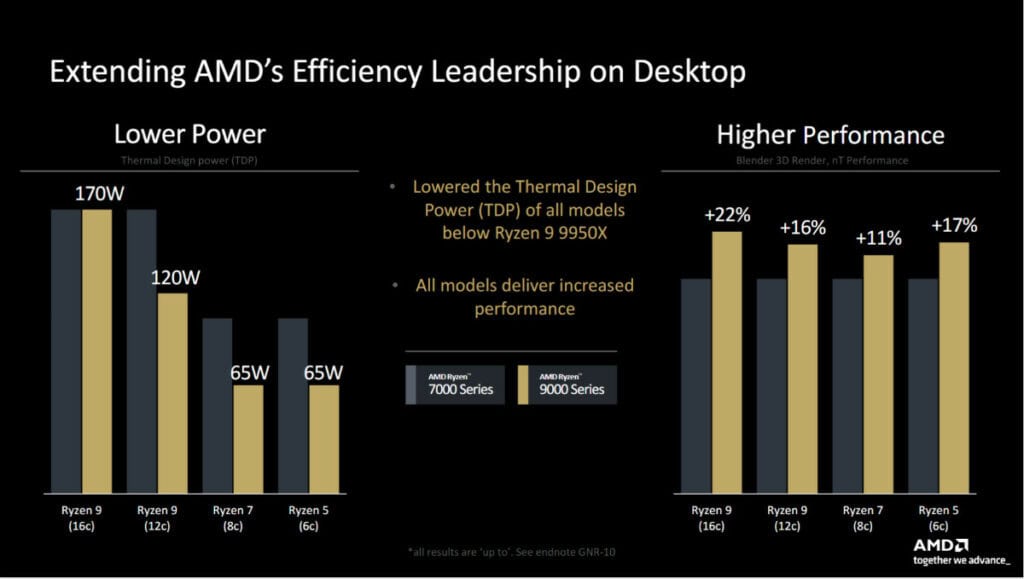
Alternatives to the 9900X and the 9700X
There are some processors that you could opt for instead of the 9990X and the 9700X, and we've listed them below. We've reviewed some of these alternative options, and you can also check out their in-depth reviews.
9900X alternatives
-
AMD Ryzen 9 7950X
- Cores: 16
- Threads: 32
- Boost clock speed: 5.7 GHz
- Base clock speed: 4.5 GHz
- L3 Cache: 64 MB
- TDP: 170W
-
AMD Ryzen 9 7900X
- Cores: 12
- Threads : 24
- Boost clock speed: 5.6 GHz
- Base clock speed: 4.7 GHz
- L3 Cache: 64 MB
- TDP: 170 W
-
AMD Ryzen 9 7900X3D
- Cores: 12
- Threads: 24
- Boost clock speed: 5.6 GHz
- Base clock speed: 4.4 GHz
- L3 Cache: 128MB
- TDP: 120W
9700X alternatives
-
AMD Ryzen 7 7700X
- Cores: 8
- Threads: 16
- Boost clock speed: 5.4 GHz
- Base clock speed: 4.5 GHz
- L3 Cache: 32 MB
- TDP: 105W
Which one should you go for?
Both processors are based on the new Zen 5 architecture and have their specific use cases. While the 9900X is a powerful CPU that should be capable of handling anything you throw at it, the 9700X provides a comparatively cheaper and more power-efficient option for mid-range to upper mid-range setups.
And it seems like we're all on the same page as our friendly neighborhood hardware experts, Jack Howarth and Seb Kozlowski, agree that the 9900X is powerful but an enthusiast pick, while the 9700X should cater to a much wider audience.
I’d advocate that the 9900X has more cores and a faster clock speed so it’s better for multi-core workloads, data crunching, simulation workloads that kind of thing, if you just need a decent CPU that you can have fun with IE play games and do some productivity work with, the 9700X is a better bet.
Jack Howarth
9900X is a powerhouse and more expensive CPU so it’s not for everyone. With higher specs it can provide greater performances in productivity tasks and something more than gaming. But for those looking for primarily gaming, and light tasks, the 9700X makes way more financial sense.
Sebastian Kozlowski



